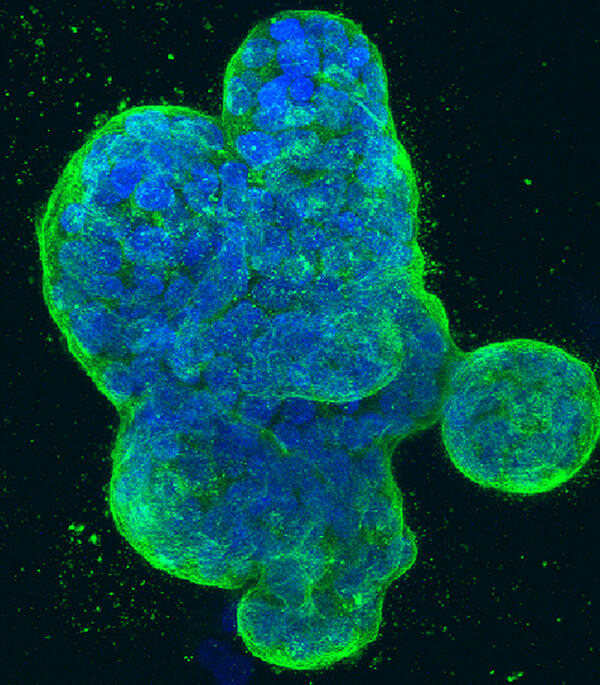The Importance of Cancer Biology Research
Research on the biology of cancer starts with the simplest of questions: What is—and isn’t—normal? To understand how cancer develops and progresses, researchers first need to investigate the biological differences between normal cells and cancer cells. This work focuses on the mechanisms that underlie fundamental processes such as cell growth, the transformation of normal cells to cancer cells, and the spread (metastasis) of cancer cells.
Virtually all major advances against cancer originated with discoveries in basic science. Basic research can reveal new ideas about the causes of cancer and how it develops, progresses, and responds to therapy.
Knowledge gained from such studies deepens our understanding of cancer and produces insights that could lead to new clinical interventions. For example, studies of cell signaling pathways in normal cells and cancer cells have contributed greatly to our knowledge about the disease, revealing molecular alterations that are shared among different types of cancer and pointing to possible treatment strategies.
Decades of basic research in cancer biology have created a broad base of knowledge that has been critical to progress against the disease.
Selected NCI Activities in Cancer Biology Research
Federal funding for cancer biology is essential because this area of research receives relatively little funding from entities that are driven by profit. NCI supports and directs cancer biology research through a variety of programs and approaches. For example:
- The Metastasis Research Network (MetNet) supports research to improve our understanding of how cancer spreads. Cancer metastasis is a complex, dynamic, nonlinear process. The network supports several specialized centers working collaboratively on multidisciplinary projects focused on several themes of the metastatic process, including mechanisms of early dissemination, cellular and physical microenvironment crosstalk, dormancy, and mechanisms of responses to therapy by metastatic cells.
- The Translational and Basic Science Research in Early Lesions (TBEL) Program is advancing the understanding of the mechanisms driving, or restraining, the development of precancers and early cancers, as well as informing the development of precision prevention approaches. The program supports multidisciplinary research centers that are integrating basic and translational research to investigate the interactions of an early lesion, its microenvironment, and host factors as “co-organizers” of tumor initiation and the development of cancer.
- The Human Tumor Atlas Network is constructing 3-dimensional atlases of the cellular, morphological, and molecular features of human cancers as they evolve from precancerous lesions to advanced disease. The atlases, which represent a diverse patient population, will also be used to study how tumors respond to treatment and develop resistance to drugs.
- The Cancer Tissue Engineering Collaborative (TEC) supports the development and characterization of state-of-the-art biomimetic tissue-engineered technologies for cancer research. This program advances innovative, well-characterized in vitro and ex vivo systems available for cancer research, expands the breadth of these systems to several cancer types, and promotes investigations of cancer with tissue-engineered systems.
- The Cancer Systems Biology Consortium (CSBC), which includes cancer biologists, engineers, mathematicians, physicists, and oncologists, aims to tackle the most perplexing issues in cancer to increase our understanding of tumor biology, treatment options, and patient outcomes. The initiative takes an integrative approach to cancer research, with the goal of improving the lives of people with cancer.
- The consortium of tumor glycomics laboratories and their research partners that make up the Alliance of Glycobiologists for Cancer Research are investigating the cancer-related dynamics of complex carbohydrates. The alliance, which NCI sponsors with the National Institute of General Medical Sciences and the National Heart, Lung, and Blood Institute, aims to study the structure and function of glycans in relation to cancer.
- The NCI RNA Biology Initiative facilitates the exchange of information and expertise among investigator studying the structure, function, and biological roles of RNA for the purpose of developing new cancer diagnostics and therapies.
- NCI’s Centers of Excellence bring together the institute’s intramural researchers to collaborate on new projects and initiatives in various areas of cancer biology, including Chromosome Biology and Genitourinary Malignancies.
Recent Research Findings in Cancer Biology
- Technique targeting cell marker boosts treatment options for B-cell lymphomas
- Scientists Link a Single Type of Bacteria to Colorectal Cancer
- Stress-Induced Immune Changes May Help Cancer Spread
- Manipulating an Immune Cell May Make Radiation Therapy More Effective, Study Suggests
- Antibody Drug Ejects Problematic Proteins from Cancer Cells
- Molecular Burglary: Cancer Cells Hijack Energy from Immune Cells
- A Better Biomarker for Cancer Immunotherapy?
- New Class of Compounds Rewires Cancer Cells to Self-Destruct


